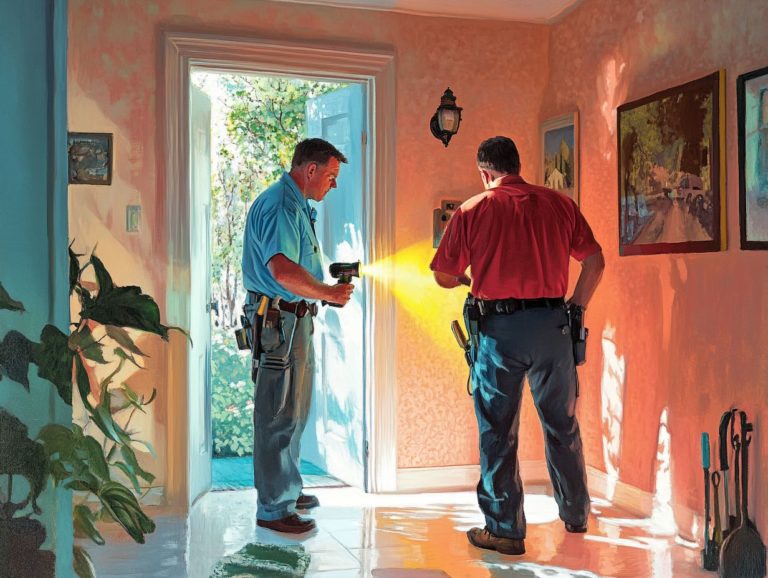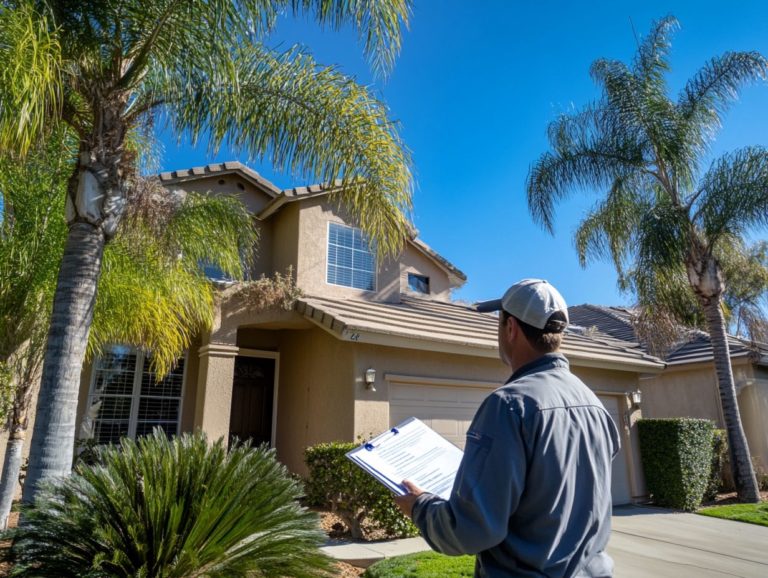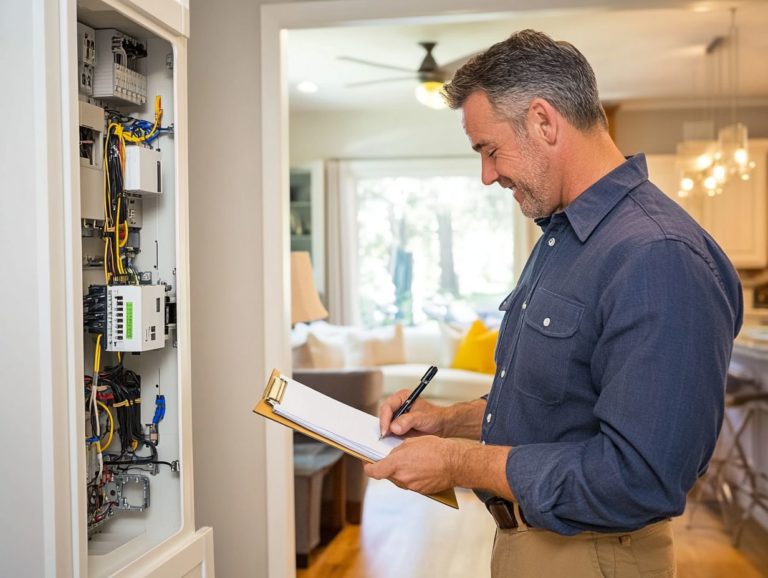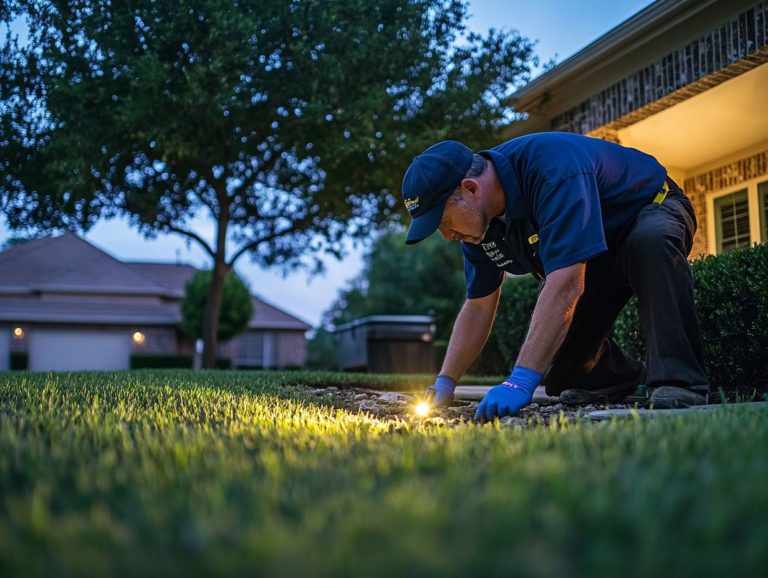The Importance of Home Inspections for Property Investors
When you invest in property, grasping the condition of a home is paramount. Home inspections serve as an essential tool, enabling you to uncover potential issues and sidestep costly surprises later on.
This article delves into what a home inspection involves, the benefits it provides for property investors, and the common issues that may surface during the process.
You ll learn how to select a qualified inspector and discover tips for maximizing the value of your inspection report. Whether you re a seasoned investor or a first-time buyer, this guide will arm you with the knowledge necessary to make informed decisions.
Contents
- Key Takeaways:
- Understanding Home Inspections
- Benefits of Home Inspections for Property Investors
- The Home Inspection Process
- Common Issues Found in Home Inspections
- Choosing a Home Inspector
- Tips for Maximizing the Value of Home Inspections
- Preparing for the Inspection Report
- Frequently Asked Questions
- What is the importance of home inspections for property investors?
- How often should property investors conduct home inspections?
- What are some common issues that can be uncovered during a home inspection?
- Can home inspections help property investors negotiate a better deal?
- Are there any benefits of conducting a home inspection for new constructions?
- What should property investors look for in a home inspector?
Key Takeaways:

Home inspections are crucial for property investors to identify potential issues and cost savings before purchasing a property, highlighting the importance of home inspections in property transactions.
Hiring a professional home inspector with the right qualities is essential for a thorough and accurate inspection.
Properly preparing for and utilizing the inspection report can help investors maximize the value of their investment.
Understanding Home Inspections
Home inspections are crucial for real estate investors as they help you evaluate investment properties effectively. Understanding the importance of home inspections in real estate can enhance your decision-making process.
A home inspection functions as a thorough property assessment that uncovers potential structural issues, safety concerns, and hidden damages that could jeopardize your financial security.
By adhering to building codes and familiarizing yourself with safety standards, you can leverage inspection reports as a powerful negotiation tool, enhancing your negotiating strength and securing a sound investment.
It’s crucial for you to appreciate the importance of home inspections in real estate transactions to protect your investments and reduce the risks associated with property ownership.
What is a Home Inspection?
A home inspection is a meticulous examination of a property’s condition, conducted by certified home inspectors to uncover any potential safety concerns and assess structural integrity.
This essential process involves a detailed evaluation of various components. For instance, inspectors examine the roofing system, searching for signs of wear, damage, or leaks that could lead to costly repairs down the line.
They also scrutinize the foundation to ensure it’s stable and free of cracks that might signal deeper issues. Electrical systems are assessed for safety and compliance, plumbing is inspected for leaks and functionality, and HVAC systems are evaluated to confirm efficient heating and cooling.
Such thorough assessments not only pinpoint any immediate repair needs but also offer invaluable insights into the overall value and longevity of the property. This makes the home inspection an essential step for anyone considering a purchase.
Benefits of Home Inspections for Property Investors
Home inspections offer huge benefits for property investors, highlighting the importance of home inspections in real estate deals by providing crucial insights into potential repair costs and hidden damages that could significantly affect your investment returns.
By uncovering these issues early on, you empower yourself to make informed decisions about your properties and strengthen your negotiation leverage during transactions.
Home inspections protect you from unexpected expenses that can threaten your financial stability, positioning you for a more lucrative investment over time.
Identifying Potential Issues and Cost Savings
Identifying potential issues during a home inspection can lead to significant cost savings for you as a property investor, as it enables you to address hidden damages before they escalate into major repair costs. Understanding the importance of thorough home inspections is crucial in this process.
Early detection is vital in preserving your property’s value and ensuring a safe living environment.
For example, small plumbing leaks might seem minor at first, but if left unchecked, they can lead to extensive water damage and mold growth, resulting in costly remediation efforts.
Similarly, neglecting outdated electrical systems could expose you to fire hazards or lead to expensive upgrades in the future.
A thorough evaluation uncovers red flags. This empowers you to negotiate repairs or price adjustments with sellers, leading to a better investment outcome.
Ready to make a smart investment? Schedule your home inspection today!
The Home Inspection Process

The home inspection process includes meticulous steps conducted by certified home inspectors. These professionals follow safety standards. They ensure a thorough evaluation of the property’s condition.
Steps and Procedures
Home inspection procedures typically start with a visual analysis of the property’s exterior. This paves the way for a thorough examination of its interior components, including structural elements, electrical systems, and plumbing.
This assessment includes a review of roofing conditions. Inspectors look for signs of wear or leaks that could lead to expensive repairs.
Next, inspectors move indoors. They check the integrity of walls, floors, and ceilings for hidden defects or safety hazards.
Major home systems, like heating and cooling, receive close scrutiny for efficiency and functionality.
Once every area has been examined, the findings are compiled into an inspection report. This document highlights structural concerns and safety risks, offering invaluable insights for prospective homeowners as they make informed decisions about their investment.
Common Issues Found in Home Inspections
Common issues uncovered during home inspections can greatly influence property evaluations and your investment decisions.
Structural problems, electrical hazards, and plumbing systems are often at the forefront of these concerns.
Structural, Electrical, and Plumbing Concerns
Structural, electrical, and plumbing issues are critical concerns revealed during home inspections. They pose risks if not addressed according to safety standards and building codes.
Ignoring these issues can create serious risks! They can lead to electrical fires, water damage, and compromised building integrity, threatening your home s safety and value.
Know the importance of building codes. They protect both your safety and your financial investment. Engaging professionals for thorough inspections and to rectify any violations is vital for a safe living environment.
Choosing a Home Inspector
Selecting a qualified home inspector is crucial for an effective property evaluation.
Certified home inspectors have the expertise to uncover critical issues that could influence your negotiation power in real estate transactions.
Qualities to Look for in a Professional Inspector
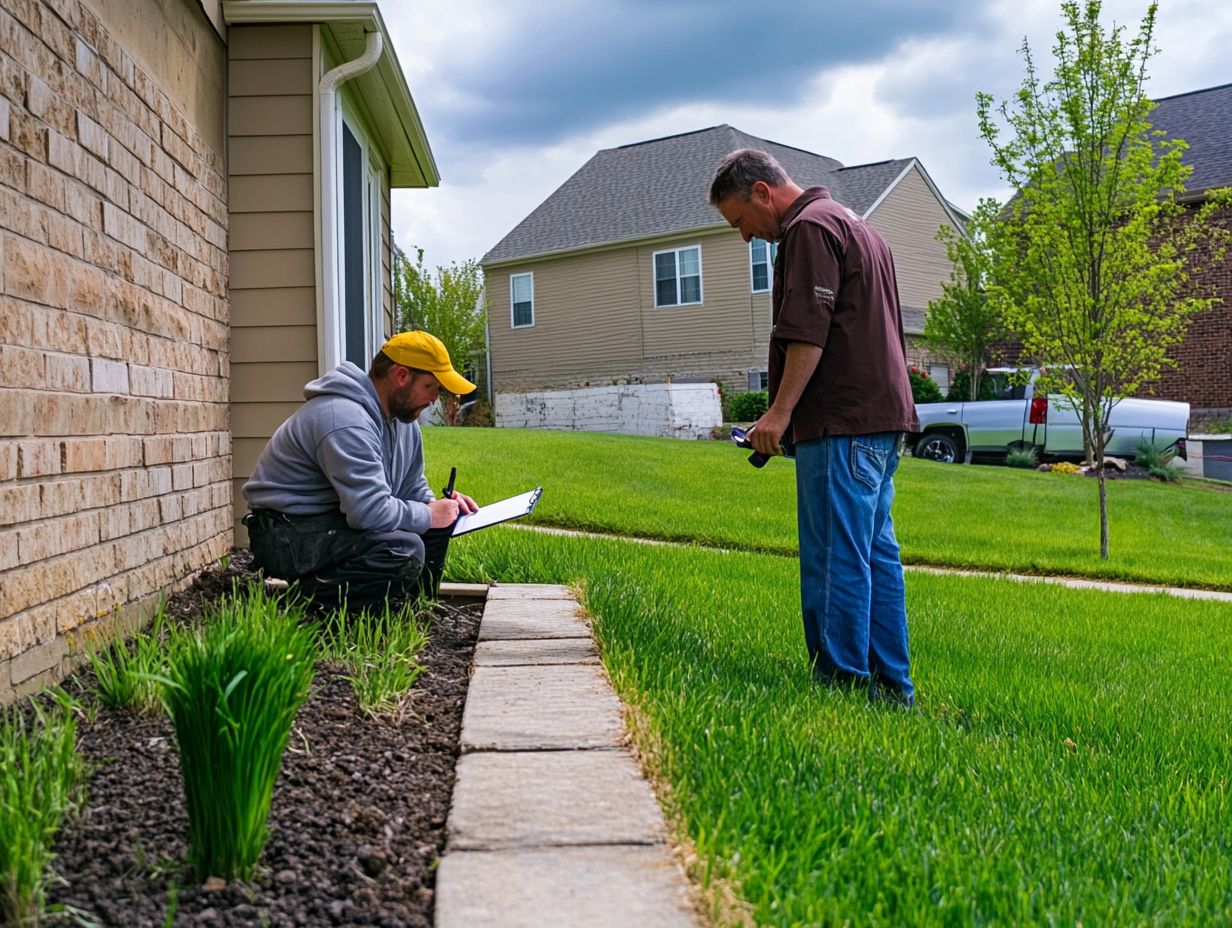
When selecting a professional inspector, prioritize key qualities like appropriate qualifications, extensive experience, and a solid reputation in the real estate community.
A reliable home inspector is thorough. They examine every aspect of the property from the roof to the foundation to ensure no potential issues slip through the cracks.
Effective communication skills are essential. They enable the inspector to convey findings and recommendations clearly. Familiarity with local rules that ensure safety is also critical, helping the inspector assess the property against necessary standards.
Together, these qualities enhance property evaluations and empower you, whether you re a buyer or a seller, to negotiate effectively. This ultimately reduces the risk of unexpected expenses later on.
Tips for Maximizing the Value of Home Inspections
To truly maximize the value of home inspections, prepare thoroughly for the inspection. Leverage the inspection report as a formidable negotiation tool in your buying or selling journey.
Preparing for the Inspection Report
Preparing for a home inspection helps you understand what to expect. Use the inspection report to negotiate important repairs for your investment.
Create a pre-inspection checklist that reviews key systems like plumbing, electricity, and heating. This proactive approach helps you spot any potential problems early.
Communicate openly with the inspector about any known issues. After the inspection, analyze the results carefully to leverage them during negotiations.
This will help ensure a fair transaction that aligns with your investment goals.
Frequently Asked Questions
What is the importance of home inspections for property investors?
Home inspections are crucial for property investors because they provide a detailed understanding of the property’s condition. Understanding the importance of home inspections for property investors helps investors make informed decisions and avoid costly surprises down the road.
How often should property investors conduct home inspections?

Property investors should conduct home inspections for every potential property they are interested in. This allows for a thorough assessment of the property’s condition and highlights the importance of home inspections in property sales, ensuring identification of any potential issues that may affect their investment.
What are some common issues that can be uncovered during a home inspection?
The most common issues include structural problems, electrical and plumbing issues, pest infestations, and water damage. These concerns can significantly impact property value and safety and should be addressed before making any investment decisions.
Can home inspections help property investors negotiate a better deal?
Yes, home inspections provide valuable information for negotiations. If a property has major issues that need fixing, investors can use this data to negotiate a lower price or request that the seller addresses the issues before closing the deal.
Are there any benefits of conducting a home inspection for new constructions?
Yes, even for new constructions, home inspections are beneficial. While they may seem perfect, underlying issues could still exist that only a professional inspector can discover. Identifying these problems early can save investors from potential headaches and financial losses in the future.
What should property investors look for in a home inspector?
Property investors should seek a licensed and experienced home inspector with a solid reputation. Ensure the inspector is thorough and provides a detailed report of their findings. Understanding the importance of pre-purchase home inspections can also help you make an informed decision. Asking for recommendations from other investors or real estate professionals can further assist in finding a trustworthy inspector.

